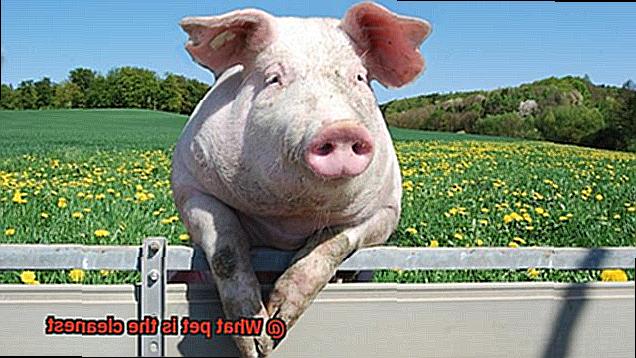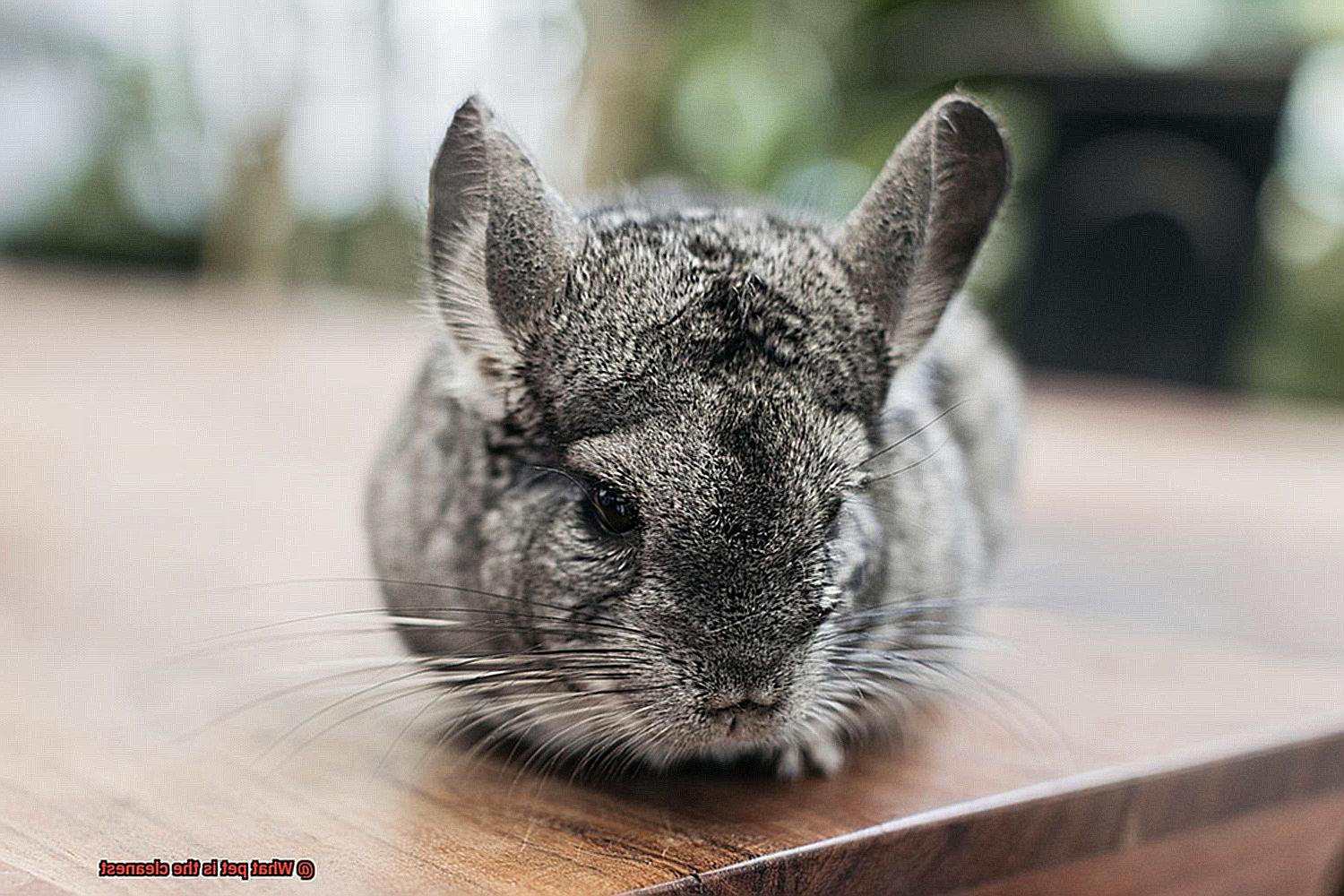As pet owners, we adore our furry friends, but let’s be real – the constant cleaning up after them can be a hassle. From muddy paw prints to shedding fur, it’s no secret that owning a pet can sometimes feel like a never-ending cleaning chore. But what if I told you that there are pets out there that require less maintenance when it comes to cleanliness? It’s true. So, which pet is the cleanest of them all?
Well, brace yourself for this one – birds take the crown for being the cleanest pets around. Not only do they have fastidious grooming habits that keep their feathers in tip-top shape, but they also don’t shed excessively like other pets. And with their petite size, they won’t take up too much space or create big messes in your home.
Now, you might be thinking that cats are known for their cleanliness and grooming habits. However, despite their reputation for being meticulous groomers, cats bring in a lot of dirt and dust into your home. And dogs? Well, let’s just say that those with short hair tend to shed more and create bigger messes.

Of course, keep in mind that birds come with their own set of considerations such as noise levels and cage maintenance. But when it comes to overall cleanliness, they’re hard to beat.
So if you’re looking for a low-maintenance pet that won’t leave your floors covered in fur or muddy paw prints, consider getting a feathered friend instead. Just remember that no matter what type of pet you choose, love and attention will always come with the occasional mess.

What Makes a Pet Clean?
The answer lies in several factors.
Firstly, grooming habits play a significant role in maintaining a pet’s cleanliness. Cats are known for their fastidious grooming habits and can spend up to half of their waking hours grooming themselves with their rough tongues. This helps remove dirt and debris from their fur, keeping it shiny and tangle-free. Dogs, on the other hand, require more frequent baths than cats to keep them clean and smelling fresh.
Living conditions also determine a pet’s cleanliness. Clean environments help keep pets clean. Fish and reptiles housed in clean aquariums or terrariums tend to be very clean animals. Clean living spaces for cats and dogs can also make a big difference in their overall cleanliness.
A balanced diet is another factor that contributes to a pet’s cleanliness. Feeding your pet high-quality food can help ensure healthy skin and coats, reduce shedding, and prevent bad breath.

When it comes to choosing the cleanest pets, fish are at the top of the list. They require minimal maintenance and do not produce any waste that needs cleaning up. Reptiles are also low-maintenance pets with low odor levels, but their enclosures require regular cleaning.
Cats are often considered one of the cleanest pets because they groom themselves regularly and bury their waste in litter boxes. However, regular grooming is still necessary as they shed fur and dander. Dogs require more maintenance than cats but can still be relatively clean pets with regular grooming and bathing.
Fish: The Cleanest Pet Option
Look no further than fish. These aquatic creatures are widely known as the cleanest pet option available, and there are many reasons why.
For starters, fish don’t produce any waste or odors that can create a mess or an unpleasant smell in your home. Unlike cats and dogs, there’s no need for litter boxes or poop scooping with fish. And, maintaining their tanks is a breeze – all you need is a siphon and some clean water to keep their tank looking fresh and healthy.
Another major advantage of having fish as pets is that they don’t carry any diseases or parasites that can be transmitted to humans. This makes them an ideal option for families with young children or individuals with compromised immune systems.
While fish may not offer the same level of interaction as cats or dogs, they can still provide a calming and peaceful presence in your home. Watching them swim around their tank can be surprisingly relaxing and therapeutic.
Overall, fish are a great pet option for those who want a low-maintenance and clean pet. Here are some more reasons why:
– Fish don’t shed, which means there’s no fur to clean up.
– They’re quiet pets that won’t disturb your neighbors.
– Fish tanks can add a beautiful aesthetic to any room in your home.
– There are many different types of fish to choose from, each with their own unique personalities and behaviors.
Reptiles: A Clean Pet Choice
Look no further than reptiles. Yes, these scaly creatures can make a fantastic choice for those looking for a clean pet. Here’s why:
Firstly, reptiles don’t shed fur or dander like cats and dogs. This means no more vacuuming hair off your furniture or dealing with pesky allergies. Plus, they don’t require regular bathing or grooming, which can save you time and money.
Before you jump into getting a reptile, however, it’s important to keep in mind that they do require a specific environment to thrive in. Ensuring that their habitat is set up correctly and investing in the proper equipment will be crucial to maintaining your pet’s health and well-being. Some species may also require a heat lamp or UV light to regulate their body temperature, so it’s essential to do thorough research beforehand.
Another benefit of having a reptile as a pet is their low odor levels. While some species may produce an odor, it’s generally less noticeable than the smells produced by cats and dogs. Reptiles also tend to have less waste output, meaning less cleaning up after them.
However, it’s important to remember that while reptiles may not require frequent grooming or produce much odor, their habitat will still need regular maintenance. This includes spot cleaning any waste or debris and disinfecting their enclosure regularly to prevent bacterial growth.
Cats: Clean but Require Maintenance
From litter box upkeep to grooming and healthcare, there are several aspects of cat care that need to be considered.

First and foremost, litter box maintenance is crucial. A clean litter box is essential for your cat’s wellbeing, as they prefer a hygienic environment for their business. Scooping the litter box at least once a day and changing it completely on a regular basis will not only keep your home smelling fresh but also prevent health issues for your furry friend.
Grooming is another important aspect of cat care to keep in mind. While cats are great at grooming themselves, they still benefit from regular brushing to remove loose fur and prevent hairballs. Some cats may also require nail trimming or dental care to maintain their health.
It’s also worth noting that cats can be prone to certain health issues that require ongoing management. Urinary tract infections, for example, are common in some cats and can be prevented or managed through medication or a special diet. Regular vet check-ups are critical for detecting any potential health problems early on.
Dogs: Clean with Proper Care and Grooming
The truth is that while dogs are naturally clean animals, they still require regular maintenance to remain healthy and tidy. In this post, we’ll explore the importance of proper care and grooming for your dog, including sub-topics such as bathing, brushing, ear cleaning, and nail trimming.
Firstly, let’s discuss the significance of bathing your dog. Bathing is essential in removing dirt and grime from your dog’s coat, but it’s crucial not to overdo it. Over-bathing can strip away natural oils from your dog’s skin, leading to dryness and itching. The frequency of bathing depends on various factors such as breed, coat type, and lifestyle. Short-haired dogs can be bathed every 3-4 months while long-haired dogs require more frequent baths every 6-8 weeks. It’s also essential to note that dogs that spend more time outdoors or are active may need more frequent baths to remove dirt and sweat.
Apart from bathing, brushing your dog’s coat regularly is equally crucial in keeping it clean and shiny. Brushing removes loose hair, mats, and tangles that can harbor bacteria and other microorganisms that cause skin infections and bad odor. The frequency of brushing depends on the coat type: short-haired dogs need weekly brushing while long-haired dogs require daily brushing to prevent matting.
Cleaning your dog’s ears is another critical aspect of grooming. Ear infections are common in dogs due to their floppy ears that trap moisture, wax, and debris, creating a perfect environment for bacteria and yeast to grow. To prevent ear infections, it’s recommended to clean your dog’s ears once a week using a cotton ball or pad soaked in a vet-approved ear cleaning solution.
Lastly, trimming your dog’s nails regularly is essential in keeping them clean and preventing them from getting too long or breaking off, causing pain and bleeding. Long nails also tend to accumulate dirt and bacteria, leading to infections. Nails should be trimmed once every 4-6 weeks depending on how fast they grow.
Tips for Keeping Pets Clean

Here are some tips that can help you keep your furry friend clean and healthy.
Establish a Regular Grooming Routine
Grooming your pet is not only important for their appearance but also for their health. Regular grooming helps remove any loose hair and prevents matting. It also helps to distribute natural oils throughout their coat, keeping it shiny and healthy. As part of your grooming routine, you can give them a bath using pet-friendly shampoo to keep their coat free of dirt and debris. Don’t forget to use pet-specific grooming tools and products to avoid skin irritation.
Maintain Their Dental Hygiene
Just like humans, pets require dental care to maintain good oral hygiene. Brushing your pet’s teeth regularly, providing them with dental treats, and scheduling professional cleanings with the vet can prevent bad breath, gum disease, and other dental problems. Neglecting your pet’s dental health can lead to serious health issues that could have been prevented.
Keep Their Living Space Clean
A clean living space is essential for your pet’s health and wellbeing. Regularly cleaning their bedding, toys, and any other areas where they spend time can prevent the spread of bacteria and odors. You should also keep their litter boxes or cages clean and sanitized to avoid any potential health risks. A clean environment will not only benefit your pet but also ensure that you are not exposed to any harmful elements.
Schedule Regular Veterinary Check-ups
Regular veterinary check-ups are crucial for detecting any underlying health issues that may affect your pet’s hygiene. During the appointment, your vet can provide recommendations on specific grooming routines and products for different types of pets. They can also prescribe medication if needed or recommend a treatment plan to improve your pet’s overall health.
Use Pet-Specific Grooming Tools and Products
Using human products or tools on your pets can cause harm to their health and hygiene. Pet-specific grooming tools and products are made with ingredients that are safe for your pet’s skin and coat. Using the right products can also prevent skin irritation or allergies, which could be dangerous to your pet’s health.
Allergy Considerations When Choosing a Pet
Choosing a new pet can be an exciting time, but it’s important to consider potential allergies before making a decision. Allergies can be triggered by pet hair, dander, saliva, and urine, so it’s crucial to find a pet that won’t cause allergic reactions.
Cats and dogs are the most popular pets, but they can also be the most allergenic. Cats produce a protein called Fel d 1, which is found in their saliva, skin, and urine and can trigger allergies in some people. Similarly, dogs produce allergens through their skin and saliva. However, there are hypoallergenic breeds such as the Bichon Frise, Poodle, and Sphynx cat that produce fewer allergens and have minimal shedding.
If you or someone in your household has allergy concerns, alternative pets like fish, reptiles, or birds may be suitable options. These pets don’t produce allergens in the same way as cats and dogs. However, it’s essential to keep their enclosures or cages clean to prevent the buildup of dust and bacteria that can also trigger allergic reactions.
It’s crucial to consult with an allergist or veterinarian before deciding on a pet with allergy concerns. They can provide tailored recommendations based on your unique needs and help you make an informed decision about which pet is right for you.
XGAu2xHFSVY” >
Conclusion
To sum it up, owning a pet is a fulfilling experience, but it requires effort and dedication to maintain their cleanliness. Popular pets like cats and dogs need regular grooming and cleaning to keep them looking their best. However, low-maintenance pets like fish and reptiles are the cleanest options as they don’t produce waste or odor.
But when it comes to being the ultimate clean freaks, birds take the cake. Their fastidious grooming habits and small size make them the cleanest pets around. Unlike other furry friends, they won’t create chaos in your home with excessive shedding or mess-making tendencies. Of course, birds come with unique considerations such as noise levels and cage maintenance, but overall, they’re hard to beat when it comes to cleanliness.
No matter which pet you choose, establishing a regular grooming routine, maintaining dental hygiene, keeping their living space clean, scheduling vet check-ups, and using pet-specific grooming tools are key for keeping your companion healthy and tidy.
Lastly, if allergies are a concern for you or someone in your household, hypoallergenic cat or dog breeds that shed minimally or alternative pets like fish, reptiles or birds may be worth considering.


